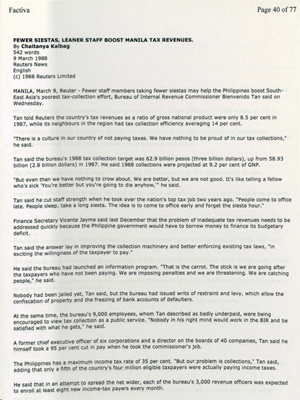FEWER SIESTAS, LEANER STAFF BOOST MANILA TAX REVENUES
[Reuters]
Published date: 9th Mar 1987
9 March 1988
Reuters News
English
(c) 1988 Reuters Limited
MANILA, March 9, Reuter – Fewer staff members taking fewer siestas may help the Philippines boost South East Asia’s poorest tax-collection effort, Bureau of Internal Revenue Commissioner Bienvenido Tan said on Wednesday.
Tan told Reuters the country’s tax revenues as a ratio of gross national product were only 8.5 per cent in 1987, while its neighbours in the region had tax collection efficiency averaging 14 per cent.
“There is a culture in our country of not paying taxes. We have nothing to be proud of in our tax collections,” he said.
Tan said the bureau’s 1988 tax collection target was 62.9 billion pesos (three billion dollars), up from 58.93 billion (2.8 billion dollars) in 1987. He said 1988 collections were projected at 9.2 per cent of GNP.
“But even then we have nothing to crow about. We are better, but we are not good. It’s like telling a fellow who’s sick ‘You’re better but you’re going to die anyhow,”‘ he said.
Tan said he cut staff strength when he took over the nation’s top tax job two years ago. “People come to office late. People sleep, take a long siesta. The idea is to come to office early and forget the siesta hour.”
Finance Secretary Vicente Jayme said last December that the problem of inadequate tax revenues needs to be addressed quickly because the Philippine government would have to borrow money to finance its budgetary deficit.
Tan said the answer lay in improving the collection machinery and better enforcing existing tax laws, “in exciting the willingness of the taxpayer to pay.”
He said the bureau had launched an information program. “That is the carrot. The stick is we are going after the taxpayers who have not been paying. We are imposing penalties and we are threatening. We are catching people,” he said.
Nobody had been jailed yet, Tan said, but the bureau had issued writs of restraint and levy, which allow the confiscation of property and the freezing of bank accounts of defaulters.
At the same time, the bureau’s 9,000 employees, whom Tan described as badly underpaid, were being encouraged to view tax collection as a public service. “Nobody in his right mind would work in the BIR and be satisfied with what he gets,” he said.
A former chief executive officer of six corporations and a director on the boards of 40 companies, Tan said he himself took a 95 per cent cut in pay when he took the commissioner’s job.
The Philippines has a maximum income tax rate of 35 per cent. “But our problem is collections,” Tan said, adding that only a fifth of the country’s four million eligible taxpayers were actually paying income taxes.
He said that in an attempt to spread the net wider, each of the bureau’s 3,000 revenue officers was expected to enroll at least eight new income-tax payers every month.
“If they get more than that they are liable for promotions when vacancies arise. But eight taxpayers is the minimum a revenue officer needs Just to hold on to his Job, he said.






